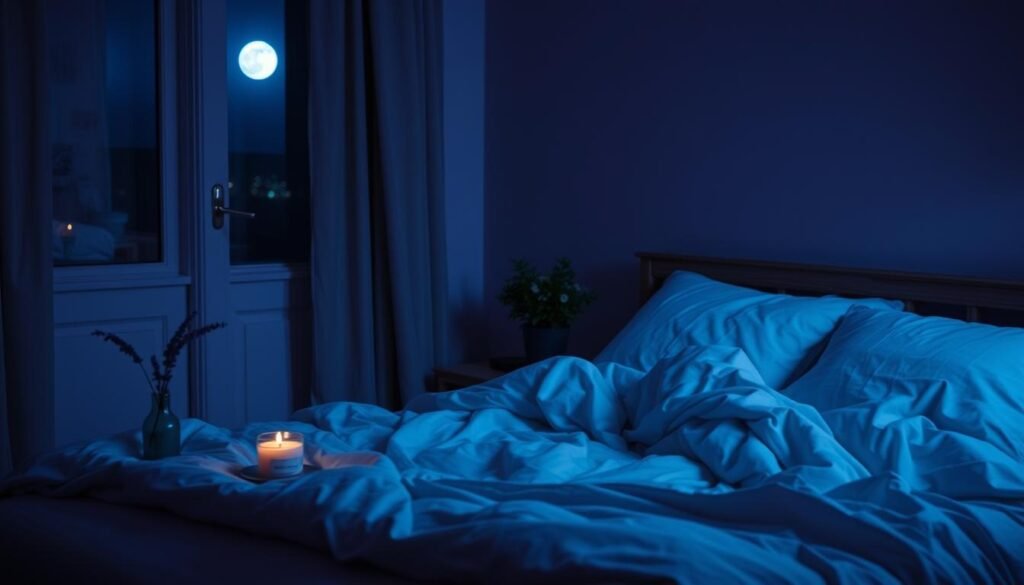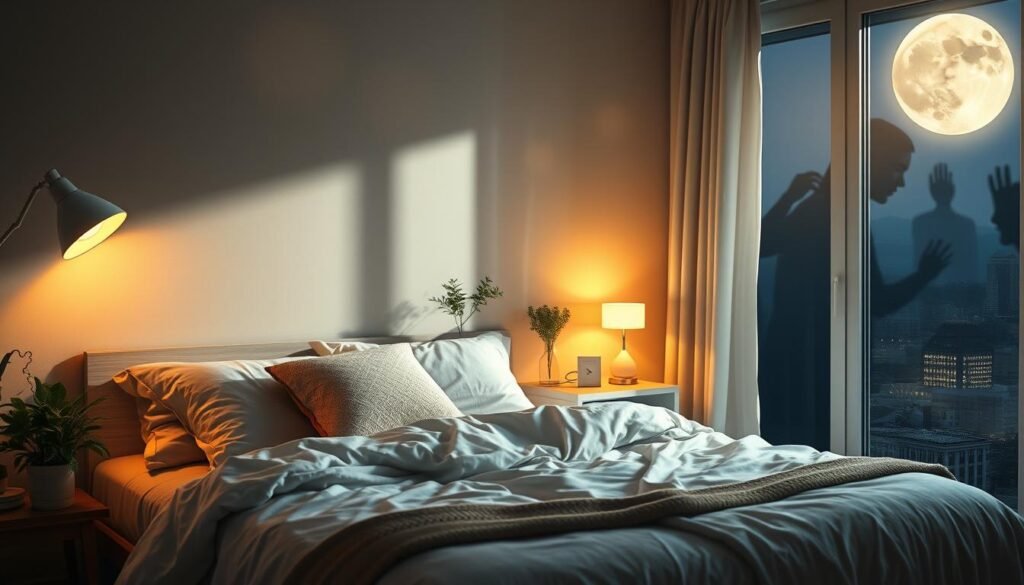Surprisingly, about one-third of Americans struggle to get enough sleep, as the CDC informs us. This highlights the urgent need to grasp the critical relationship between anxiety disorders and sleep disturbances. About 6.8 million adults in the U.S. battle with generalized anxiety disorder every year. This is roughly 3.1% of adults. Anxiety and sleep problems often go hand in hand, creating a harmful cycle that impacts emotional and physical health.
Anxiety-driven sleep deprivation can lead to serious health problems. These include heart disease, stroke, and diabetes. It shows why understanding how anxiety affects the sleep cycle is vital. This guide explains these effects. It offers coping strategies and treatments to improve sleep and well-being.
Key Takeaways
- One-third of Americans struggle with sleep, often due to anxiety.
- Generalized anxiety disorder affects 6.8 million adults annually in the U.S.
- Anxiety can severely disrupt the sleep-wake cycle, leading to chronic sleep disturbances.
- Sleep deprivation heightens the risk of serious health issues, including heart disease.
- Anxiety and sleep problems can create a feedback loop, worsening both conditions.
- Understanding the connection between anxiety and sleep is crucial for improving mental health.
Understanding Anxiety and Its Types
Anxiety involves worry, fear, or nervousness. It often starts as a response to stress. But for many, it becomes a lasting issue. Understanding anxiety and its effects can help us see how it affects our lives. About 40 million people in the U.S. have anxiety disorders, making it the most common mental health condition.
Different types of anxiety disorders impact people in unique ways:
- Generalized Anxiety Disorder (GAD): Months or years of intense worry.
- Panic Disorder: Recurring panic attacks, happening many times a day or just a few times a year.
- Social Anxiety Disorder: Causes people to avoid work, school, or social events due to a fear of being judged.
- Specific Phobias: Extreme fear of specific things or situations, like flying, heights, or animals.
- Agoraphobia: The fear of being in places where leaving might be hard. This often leads to avoiding crowds or public transport.
- Separation Anxiety Disorder: Not just in children but adults too, creating fear when away from loved ones.
- Selective Mutism: Mainly seen in children, where they don’t speak in certain social settings.
Knowing these disorders is key to understanding how they can interrupt daily life and sleep. Anxiety can mess with anxiety and sleep quality, making finding the right treatment important. Cognitive behavioral therapy (CBT) is very effective for anxiety disorders. Medications can also help.
| Type of Anxiety Disorder | Key Features |
|---|---|
| Generalized Anxiety Disorder (GAD) | Chronic, excessive worry lasting months or years |
| Panic Disorder | Recurrent panic attacks, varying frequency |
| Social Anxiety Disorder | Avoidance of social interactions due to fear of judgment |
| Specific Phobias | Intense fear of specific objects or situations |
| Agoraphobia | Fear of being unable to escape in crowded or open spaces |
| Separation Anxiety Disorder | Intense fear when separated from attachment figures |
| Selective Mutism | Nonverbal behavior in certain social situations |
The Psychological Effects of Anxiety
Anxiety disorders are very common in the United States, with 20% of adults affected. These disorders cause feelings like restlessness, irritability, and constant worry. About 43% of adults feel slightly impaired by anxiety, 33% moderately, and nearly 23% severely.
The symptoms often hurt sleep quality. Many people with anxiety find it hard to sleep well. For example, over 90% of people with PTSD from military service report insomnia symptoms. Also, 24% to 36% of those with insomnia also have an anxiety disorder. This shows the strong link between anxiety, sleep problems, and overall mental health. Generalized Anxiety Disorder, found in about 3.1% of the U.S. population, often leads to sleep issues.
Addressing the emotional effects of anxiety is key in solving sleep problems. Knowing more about this connection helps people seek the right treatments. Treatments like Cognitive Behavioral Therapy for insomnia can really help. For more on how lack of sleep affects mental health, check this resource.
The Biological Mechanisms Behind Anxiety
Anxiety is a complex issue with many factors. It involves detailed processes in the brain. Neurotransmitters, like serotonin and gamma-aminobutyric acid (GABA), are key. They help control our mood and anxiety levels. Not having enough of them can make us feel more anxious. This affects how well we sleep.
The amygdala and prefrontal cortex play a significant role in how we process and regulate emotions. The amygdala deals with fear, and the prefrontal cortex handles decisions and social behaviors. If these brain areas don’t work right, it can lead to anxiety and trouble sleeping. This makes it hard to control our emotions and sleep well.
The hypothalamus is important for sleep. It manages our body’s internal clock and sleep habits. Anxiety can upset this balance, causing sleep problems. This means it might be tough to fall asleep, stay asleep, or get deep sleep.
Understanding the link between sleep and anxiety is key in neurobiology. Knowing about these connections can help us find better treatments. It can improve how we handle anxiety and sleep issues.
| Area of Brain | Function | Role in Anxiety |
|---|---|---|
| Amygdala | Fear processing | Heightens anxiety responses |
| Prefrontal Cortex | Emotional regulation | Impairs social behavior and decision-making |
| Hypothalamus | Circadian regulation | Disrupts sleep cycles under stress |
| Serotonin & GABA | Mood stabilization | Deficiency leads to increased anxiety |
How Anxiety Impacts the Sleep Cycle and What to Do About It
Anxiety and sleep problems affect each other in a complex loop. Knowing how anxiety changes the sleep cycle helps us tackle sleep disorders and anxiety better. Insomnia, which anxiety often causes, starts a cycle that increases anxiety and sleep issues.
The Connection Between Anxiety and Sleep Disturbances
People with anxiety often struggle to fall or stay asleep, making their mental health worse. A lack of deep sleep can make anxiety worse, creating a hard cycle to break. For example, not sleeping well can raise anxiety by up to 30%, affecting how you feel and function during the day.
Sleep disturbances and anxiety go hand in hand; insomnia can make anxiety worse, and anxiety can make it hard to sleep.
Common Sleep Disorders Associated with Anxiety
Several sleep disorders that come with anxiety can mess with how well you rest. These include:
- Insomnia: Trouble falling or staying asleep, often because of anxious thoughts.
- Sleep apnea: A serious condition where breathing stops and starts, linked to more anxiety.
- Restless legs syndrome: A need to move the legs, with anxiety making it harder to sleep.
Treating these sleep issues is key. Cognitive Behavioral Therapy (CBT) is great for dealing with sleep problems caused by anxiety. CBT focuses on sleeping well regularly. Mindfulness and muscle relaxation can also help manage anxiety and sleep better.

| Sleep Disorder | Typical Symptoms | Relation to Anxiety |
|---|---|---|
| Insomnia | Problems falling asleep, waking up a lot | Often linked to worry and anxious thoughts |
| Sleep Apnea | Loud snoring, trouble breathing at night | Can lead to more stress and anxiety |
| Restless Legs Syndrome | Feeling like you need to move your legs, discomfort | May increase anxiety levels |
Using mindfulness and keeping a good sleep routine are important for dealing with sleep problems tied to anxiety. Working on relaxation can really help improve sleep and lower anxiety.
Anxiety and Sleep Quality
Anxiety deeply affects how well we sleep, leading to sleep disturbances. It makes it hard to start and keep sleeping. This problem can worsen anxiety, affecting daytime activities and mental health.
To sleep better, it’s key to have a routine. Setting a regular sleep time and unwinding before bed helps a lot. Being active during the day can also boost mood by lowering anxiety.
Cognitive-behavioral therapy (CBT) is effective for managing harmful thoughts that affect anxiety and sleep. CBT promotes good sleep habits and mindfulness. This includes techniques for body relaxation that can help ease the mind for sleep.
Getting sunlight during the day helps reset our sleep cycle, improving sleep for those with anxiety. A set daily routine adds control and predictability, aiding mental health and sleep.
Understanding sleep’s role in managing anxiety is vital. Lack of sleep can increase stress and anxiety. The link between anxiety and sleep quality is strong, making it important to find ways to improve sleep with anxiety treatment.
Coping with Anxiety-Induced Sleep Issues
Coping with sleep problems caused by anxiety needs several steps to improve sleep. It’s important to understand how anxiety and sleep affect each other. In the U.S., anxiety is very common, and often, it leads to insomnia.
Here are tips for beating anxiety-related sleep problems. Start with bedtime routines and stress management. Deep breathing and muscle relaxation can calm your mind at night. Adding meditation to your routine helps lower anxiety and lets you sleep better.
Using your phone or computer less at night can help. The blue light from screens messes with sleep cycles and worsens insomnia. Try to avoid screens before bed to make your sleep area more peaceful.
Exercise daily to deal with anxiety and sleep issues. It lowers your stress and helps you sleep deeper. Eating right, staying away from caffeine and alcohol, and having a comfy bedroom are key steps too.
If sleep troubles continue, it might be time to seek help. Cognitive behavioral therapy (CBT) deals with the thoughts and behaviors causing sleep problems. Checking for medical issues or changing medications might also be needed.

| Strategies | Description |
|---|---|
| Relaxation Techniques | Deep breathing and progressive muscle relaxation help calm the mind. |
| Mindfulness Practices | Meditation and mindfulness reduce stress and improve sleep quality. |
| Limiting Screen Time | Avoiding devices before bed helps maintain a natural sleep-wake cycle. |
| Physical Activity | Regular exercise lowers anxiety levels and encourages deeper sleep. |
| Cognitive Behavioral Therapy | CBT helps modify thoughts and behaviors related to sleep anxiety. |
Managing Anxiety for Better Sleep
Many people with anxiety find it hard to sleep well. Sleep hygiene tips can really help improve this. To sleep better despite anxiety, you need to change your environment, create a routine, and learn how to relax.
Sleep Hygiene Tips for Anxiety Sufferers
To improve your sleep, some practices can really help. These tips are specially for those with anxiety.
- Create a comfortable sleep environment—ensure the bedroom is dark, quiet, and cool.
- Establish a regular sleep routine by going to bed and waking up at the same time each day.
- Avoid caffeine and heavy meals within 3 to 7 hours before bedtime.
- Engage in calming pre-sleep activities such as reading, gentle yoga, or meditation to unwind.
- Consider using techniques like deep breathing or progressive muscle relaxation to help alleviate nighttime anxiety.
- Limit screen time before bed to reduce stimulation from electronic devices.
- Set aside time during the day for ‘worry time’ to address concerns without letting them interfere with sleep.
When you’re addressing anxiety to improve sleep patterns, remember that anxiety and sleep affect each other. By understanding this and using these tips, you can manage your anxiety and sleep better.
| Sleep Hygiene Tip | Benefit |
|---|---|
| Comfortable sleep environment | Enhances relaxation and reduces distractions |
| Regular sleep schedule | Improves circadian rhythm and sleep consistency |
| Avoiding caffeine and heavy meals | Reduces the risk of sleep disruption |
| Calming pre-sleep activities | Alleviates anxiety and prepares the mind for sleep |
| Deep breathing techniques | Helps manage anxiety and promotes relaxation |
Improving Sleep with Anxiety Treatment
Many people struggle with both insomnia and anxiety disorders. They find that their sleep problems are linked to their anxiety. Studies tell us that insomnia is very common in the U.S., touching 50 to 70 million folks. Cognitive Behavioral Therapy for Insomnia (CBT-I) is a proven help. It deals with the bad thoughts we have about sleep and anxiety. This leads to much better sleep quality.
Cognitive Behavioral Therapy for Insomnia (CBT-I)
CBT for insomnia teaches individuals to notice and change unhelpful thoughts and actions about sleep. Through CBT-I, individuals learn ways to manage their anxiety. This helps lessen insomnia symptoms. It turns out, 20% to 45% of people with panic disorder often have panic attacks at night. This shows how vital managing anxiety is for good sleep.
Sleep hygiene can help improve CBT-I’s effects. These actions help make the right sleep setting and a stable bedtime schedule. Getting 7-8 hours of sleep a night helps fight insomnia and boosts mental health. Reducing screen time before bed and practicing relaxation techniques like deep breathing or yoga also aid in reducing anxiety and bettering sleep quality.
Combining CBT-I and anxiety management strategies looks promising for overall well-being. Getting help from medical and mental health experts can offer customized ways to address sleep and anxiety challenges. This path leads to healthier, more restful nights. To discover more about sleep and anxiety, check out this resource.

Anxiety Management Strategies for Better Sleep
Anxiety can greatly affect your sleep, sometimes causing insomnia or oversleeping. By using good strategies to manage anxiety, your sleep can improve. This can make you feel overall better. There are many methods that can help you sleep more peacefully. These include therapy, medicine, and changing some habits.
One way to fight insomnia and anxiety is through Cognitive Behavioral Therapy (CBT). Doing yoga has also helped many people sleep better. It shows the strong link between being physically active and feeling calm. Changing your daily routine is also key. Try to sleep and wake up at the same time, limit naps to under an hour, and avoid screens before bed.
Some studies suggest that taking melatonin can help you fall asleep faster and stay asleep. Drinking chamomile tea, which is calming, can improve your sleep too. Knowing these methods can help you pick the best ways to manage your anxiety for better sleep.
It’s crucial to see how connected our mental health and sleep are. Aim for at least seven hours of sleep each night. Pay attention to your daytime sleep patterns and keep your bedroom comfortable for sleep. By following these steps, you can create a better sleep routine. This leads to more refreshing sleep.
Addressing Anxiety to Improve Sleep Patterns
Improving sleep by handling anxiety is key for better mental health. Studies show that 33% of people with insomnia have an anxiety disorder too. This shows a big link between sleep issues and anxiety. Anxiety needs to be managed well for better sleep. High stress and anxiety can lead to more cortisol, making sleep problems worse. When anxiety gets worse, starting and keeping sleep becomes hard.
A lot of people with anxiety find it hard to sleep well. They may have trouble falling asleep, wake up often, or wake up too early. Half of those with anxiety face these sleep challenges. This creates a bad cycle where anxiety hurts sleep, and bad sleep makes anxiety worse.
It’s important to treat both insomnia and anxiety effectively. Cognitive Behavioral Therapy for Insomnia (CBT-I) is a proven method. It helps by changing negative thoughts and behaviors that prevent sleep. Sometimes, doctors may also suggest medication to help improve sleep.
Making lifestyle changes can improve sleep too. Regular exercise helps produce melatonin, which is good for sleep. Adding exercise to a healthy diet, less alcohol and nicotine, and stress-reducing exercises like yoga can help. Good sleep habits are very important. You can find more tips on handling anxiety at Sleep Foundation.
Conclusion
The link between anxiety and sleep is key to fixing anxiety-related sleep problems. A large number of adults in the U.S.—9-20%—suffer from insomnia. This shows the urgency of finding ways to better sleep and mental wellness. Studies show that anxiety does not just lead to sleep issues; it also increases the risk of depression.
It’s important for readers to use the suggested strategies for better sleep hygiene and try treatments like Cognitive Behavioral Therapy for Insomnia (CBT-I). Understanding the anxiety and sleep connection helps improve your overall health. Getting help for sleep issues caused by anxiety can improve your mental health and your sleep.
Knowing about the widespread impact of insomnia is crucial, as research reveals about 50% of people with anxiety have sleep problems. This makes focusing on sleep a key part of handling anxiety. Better sleep is essential for your health, helping both your mind and body.